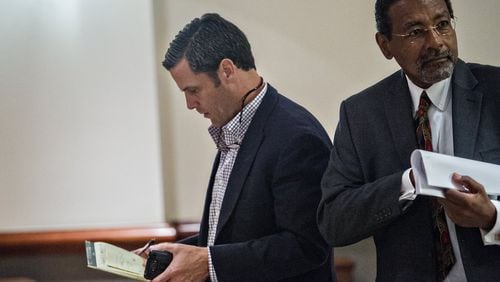Verdicts at a glance
Location: Whitaker Street N.W.
Trial Date: May 27
Verdict: Not guilty on one count of owning or operating a vacant, open and unsecured dwelling; Not guilty on two counts of owning or operating a dilapidated, decayded, unsafe, unsanitary dwelling.
Location: James P Brawley Drive N.W.
Trial Date: June 16
Verdict: Guilty on one count of owning or operating a vacant, open and unsecured dwelling.
Location: Rome Drive N.W.
Trial Date: July 28
Verdict: Guilty on one count of owning or operating a vacant, open and unsecured dwelling.
View this story online at myAJC.com and watch a special AJC video about English Avenue.
A Buckhead real estate investor facing prosecution for squalid conditions at houses in an impoverished west Atlanta neighborhood faces almost certain jail time after being found guilty on two housing code violations Tuesday.
Rick Warren has stood trial in Atlanta Municipal Court three times since May on citations issued during a November 2014 code enforcement sweep on his properties, but Judge Crystal Gaines withheld verdicts on all of the cases until Tuesday, when the businessman was scheduled to stand trial on charges related to a fourth house.
Instead, Gaines announced guilty verdicts in two of the trials, and found Warren not guilty on three counts relating to the third. Charges for the scheduled fourth trial were dropped because prosecutors think Warren no longer owned that house when he was cited.
As a repeat offender, Warren faces a mandatory sentence of at least 30 days in jail on both guilty verdicts. Sentencing is set for Oct. 20, and Warren is out on $2,000 bond pending appeal.
The convictions are victories for Atlanta’s over-worked code enforcement division and Mayor Kasim Reed, who made an unusual public appeal for Warren’s conviction.
Through a spokeswoman, Reed said Tuesday that Gaines’ decision is “a significant step forward in the revitalization of Vine City and English Avenue.”
“Rick Warren is an admitted repeat offender of the City of Atlanta’s housing code, and he has engaged in a level of lawless behavior with little to no regard for the quality of life of residents in the community. Our Administration said that this behavior would not be tolerated and we are pleased with the ruling of the court,” Reed said in a written statement.
Warren and his attorney George Lawson declined comment after the verdicts were read. Warren faces trial again for another property on Oct. 20, the same day he's to be sentenced on Tuesday's verdicts.
Warren was found guilty even though the houses were owned by limited liability corporations that were not listed under his name. Lawson argued that his client was not responsible for their conditions because he was not their owner or operator. But witnesses testified that Warren was in charge of day-to-day operations at those businesses, and records showed he had an ownership interest.
Code enforcement officers targeted Warren after an Atlanta Journal-Constitution investigation that found that he had purchased some 10 percent of the houses in and around the historically black English Avenue neighborhood, leaving many vacant and crumbling. For years, Warren paid fines when he was cited for vacant houses infested with rats and overgrown with weeds, then continued to re-offend. Neighbors complained that drug dealers set up shop inside his properties, undermining attempts to revive the neighborhood.
English Avenue, which has been scarred by the heroin trade, was the victim of rampant mortgage fraud during the housing boom. It then became the site of aggressive property speculation because it sits next door to the construction of a new Atlanta Falcons stadium and a planned segment of the Beltline.
Warren became perhaps the neighborhood’s biggest speculator. He purchased dozens of properties at a time for as little as a few hundred dollars a piece from other investors who fell on hard times during the housing crisis. While some were kept vacant, he rented some of them out and tenants complained of unsafe conditions.
“I think justice was served here,” said Michael Lucas, deputy director of the Atlanta Volunteer Lawyers Foundation, which sued Warren on behalf of tenants. “We don’t think Mr. Warren’s business model is one that works in the City of Atlanta.”
English Avenue residents now wonder what will happen to Warren’s properties. He tried to sell some to the Fulton County/City of Atlanta Land Bank Authority, which is working to revitalize the neighborhood, but the deal fell apart under Reed’s objections. Warren owns so much of the neighborhood that redevelopment may be difficult without his cooperation.
State Rep. Mable Thomas, D-Atlanta, hopes that Warren works with community groups to turn the properties into affordable housing.
“Hopefully he sees the light, whether in jail or not, to do something positive,” Thomas said.
About the Author







